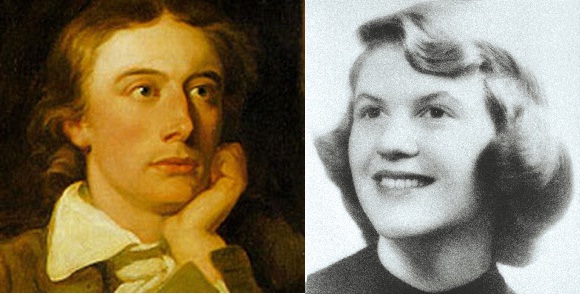A Sylvia Plath and John Keats Quote Off: Who Said it Best?
By Meaghan Wagner

Left: Portrait of John Keats by William Hilton / Right: A 1955 portrait Sylvia Plath, photographed at Smith College.
Biographile’s This Week in History remembers events of the past, and the icons that set them in motion. If you're stirred by the words below, read on for more inspiring author quotes.
This week in history we celebrate the births of two prodigious poets: Sylvia Plath born October 27, 1932 and John Keats October 31, 1795. Keats was famed for sensual imagery and his worship of beauty, be it real or only in his imagination. Plath, of course, is most well known for her tortured battle with depression which fed her unbelievably piercing observations.
With two such different temperaments at hand, what better way to honor the birth of these two titans of verse than to round up some of their greatest quotes and compare notes? From greatness and love to writing and hardship, check out who said it best below.
On Greatness:
Keats: “I would sooner fail than not be among the greatest.”
Plath: “I too want to be important. By being different. And these girls are all the same.”
On Imagination:
Plath: “Imagination is more important than knowledge.”
Keats: “What the imagination seizes as beauty must be truth.”
On Personal Reflection:
Keats: “My imagination is a monastery and I am its monk.”
Plath: “I never feel so much myself as when I’m in a hot bath.”
On Experience:
Plath: “Why can’t I try on different lives, like dresses, to see which one fits me and is most becoming?”
Keats: “Nothing ever becomes real till it is experienced.”
On Writing:
Keats: “It is easier to think what Poetry should be than to write it.”
Plath: “Let me live, love and say it well in good sentences.”
On People:
Plath:“I love people. Everybody. I love them, I think, as a stamp collector loves his collection. Every story, every incident, every bit of conversation is raw material for me.”
Keats: “Scenery is fine - but human nature is finer.”
On Hardship:
Keats: “Do you not see how necessary a world of pains and troubles is to school an intelligence and make it a soul?”
Plath: “The hardest thing is to live richly in the present without letting it be tainted out of fear for the future or regret for the past.”
